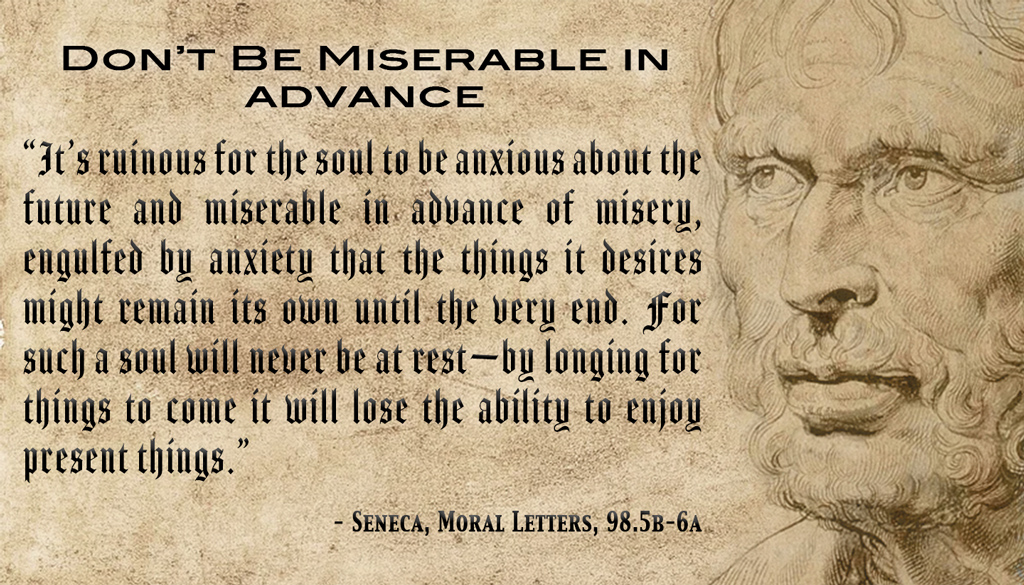Seneca, the renowned Stoic philosopher, once wisely stated in his “Moral Letters,” “It’s ruinous for the soul to be anxious about the future and miserable in advance of misery, engulfed by anxiety that the things it desires might remain its own until the very end. For such a soul will never be at rest — by longing for things to come, it will lose the ability to enjoy present things.” These timeless words offer a profound insight into the detrimental effects of excessive worrying and preoccupying ourselves with the uncertainties of the future.
Anxiety is often an uninvited guest in our lives, and it tends to make its presence known when we are waiting for something. By definition, the act of waiting anxiously implies that the event has not yet occurred, and this sensation is entirely voluntary. We choose to let our minds become engulfed in this feeling, and the consequences can manifest not only in our thoughts but also in our physical well-being. Heart rate spikes, uncontrollable sweating, insomnia, and other symptoms often accompany this self-inflicted mental anguish. To avoid these distressing symptoms, it’s essential to adopt a more pragmatic approach to life.
The pragmatic individual, often seen as a person of action, understands that worrying about every possible outcome in advance is an exercise in futility. Instead of dwelling on the hypothetical scenarios, they choose to focus on the facts and prepare for the uncertainties that lie ahead. This involves a deliberate, systematic approach that can provide peace of mind and reduce the unnecessary suffering caused by chronic worrying.
Here are some practical steps to follow in embracing pragmatism and freeing yourself from the clutches of anxiety:
1. Perform a Risk Assessment: The pragmatic person starts by assessing the risks associated with the impending event. This includes considering both the best-case and worst-case scenarios. By understanding the range of possibilities, you gain a more realistic perspective on what might occur.
2. Gather Historical Data: Seek out historical failure reports or case studies related to situations similar to the one you are facing. Analyze these to identify common patterns and root causes of problems that may arise.
3. Create a Contingency Plan: Armed with a comprehensive understanding of potential outcomes, create a series of documented actions that you can take in response to each scenario. Having a well-defined plan in place can help you maintain control and confidence in the face of uncertainty.
4. Be ready for Murphy with an Exception Plan: “Anything that can go wrong will go wrong” is Murphy’s Law, and the pragmatic person acknowledges its existence. While we can’t predict every possible mishap, we can create an exception plan. This involves having a detailed strategy in place to revert to or recover from a previous state if “something” goes wrong. By accounting for unforeseen challenges and having a plan to address them, you significantly reduce the element of surprise and are better equipped to handle adversity when it arises.
Seneca’s wisdom extends beyond the immediate realm of our emotional well-being. Chronic anxiety, characterized by perpetual worry and preoccupation with the future, can be particularly destructive in the long run. It not only casts a shadow over our present happiness but also takes a toll on our overall health. Prolonged periods of tension can lead to various physical and mental health issues, including high blood pressure, heart problems, weakened immune function, and even mental health disorders such as depression and anxiety disorders. Furthermore, the relentless burden of anxiety can strain our relationships, obstruct personal and professional growth, and ultimately diminish our quality of life.
By following the steps outlined above and adopting a pragmatic mindset, you’ll discover that anxiety gradually loosens its grip on your life. As you transition from a state of needless fear and worry to one of preparedness and confidence, you not only enhance your current well-being but also safeguard your long-term health and happiness. With a well-defined plan in place, you can focus on cherishing the present moment and the things you have now, as Seneca wisely advised. The future will arrive regardless, but you have the power to meet it with a well-thought-out strategy rather than apprehension.
#pragmatism #stoicism #planning #exceptionhandling


Leave a Reply